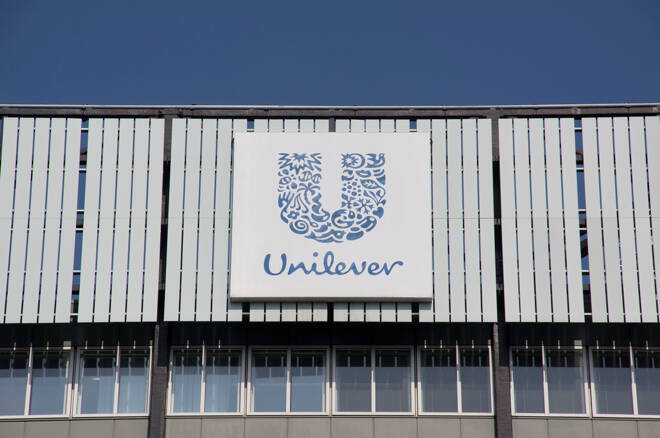Does a Bull Market Beckon for Unilever?
By:
Unilever shares are attempting to enter a bull market ahead of its Q1 earnings release on Thursday, April 23.
Since hitting a three-year low on March 16, the stock’s price has surged over 18 percent and could climb above the 20 percent threshold if its earnings surprise to the upside.
Covid-19: Reason to be hawkish on Dove maker’s prospects?
One would think that, given the heightened levels of personal hygiene and the need for sanitized homes amid a virus outbreak, the top line of the world’s largest soap maker would be greatly boosted.
However, Unilever’s more than 400 brands are not all created equal, and the 2.5 billion people who use a Unilever product each day have tough choices to make.
As of end-2019, over 37 percent of its revenue came from its foods and refreshment segment, which has been hurt badly as consumers are barred from dining out. The lockdown and quarantine measures worldwide are expected to severely dent sales of its restaurant food solutions, while even the seemingly ubiquitous likes of Ben & Jerry’s Ice Cream are unlikely to have been spared the icy-cold reception from consumers amid the pandemic.
Also noting that amid the ramp-up in sales of such low-margin personal care products, its higher-margin beauty products are being eschewed amid “stay at home” worldwide, which could erode Unilever’s bottom line.
Global recession to lay bare Unilever’s EM dependence
Unilever’s reliance on emerging-markets, which accounts for 60 percent of its total sales, is helping the company offset the sales slump in developed economies amid the ongoing lockdown measures. However, looking further out, the global recession this year is set to expose EM’s vulnerabilities and depress consumers’ purchasing power. Set against such an economic backdrop, Unilever is unlikely to meet its long-term goal of 3-5 percent in sales growth for the full year, although the target could still be achieved amid the lockdown-fueled purchases in Q1.
Cash is King – but who gets to keep it?
Even before pandemic struck, Unilever had embarked on a cost savings programme of two billion Euros per year while aiming to boost its operating margin to 20 percent. Although the programme might have to be shelved for the time being, such efforts have put the company’s balance sheet on a stronger footing to weather 2020’s seismic shift in consumer spending. Unilever’s cash pile of over five billion Euros as at end-2019 should also help the FMCG giant weather the storm.
As for equity investors, they appear to be flocking to Unilever’s shares on the promise of dividends, with the company having a dividend payout ratio exceeding 50 percent in nine out of the last 10 years. Although Unilever’s high dividend payout ratio, relative to its peers, may have to be diluted in the name of conserving cash amid the pandemic, the overall defensive nature of the consumer goods sector, coupled with the lure of payments to shareholders, may be too tempting an offer to resist amid the tumult and dividend-scarcity in global financial markets.
Written on 04/21/20 08:00 GMT by Han Tan, Market Analyst at FXTM
For more information, please visit: FXTM
Disclaimer: This written/visual material is comprised of personal opinions and ideas. The content should not be construed as containing any type of investment advice and/or a solicitation for any transactions. It does not imply an obligation to purchase investment services, nor does it guarantee or predict future performance. FXTM, its affiliates, agents, directors, officers or employees do not guarantee the accuracy, validity, timeliness or completeness of any information or data made available and assume no liability for any loss arising from any investment based on the same.
Risk Warning: CFDs are complex instruments and come with a high risk of losing money rapidly due to leverage. 81% of retail investor accounts lose money when trading CFDs with this provider. You should consider whether you understand how CFDs work and whether you can afford to take the high risk of losing your money.
About the Author
Han Tancontributor
A highly experienced financial journalist and producer with more than seven years of experience gained across some of Southeast Asia’s (SEA) most prominent business broadcasters.
Advertisement
